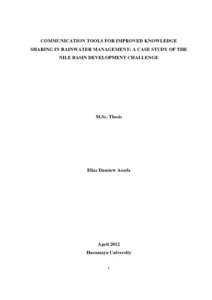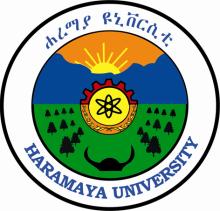Resource information
Communication and knowledge sharing among stakeholders working in rainwater management has a paramount importance to create shared understanding and to narrow the gap between research and action. Even though various rainwater management initiatives have been undertaken in Ethiopia in the last thirty years, there has been limited opportunity to share experience, to take valuable lessons and avoid duplication of efforts. This paper attempted to describe NBDC stakeholders’ understanding on concepts and practices of RWM. It then assessed knowledge sharing challenges in RWM and finally went to evaluating and identifying communication and knowledge sharing tools for stakeholders in NBDC. By stratifying stakeholders as Policy Makers, Development Actors, Research Institutes and farmers, multi-stage sampling was used at organizational and individual levels to draw 129 respondents from selected stakeholders which were MoA, GIZ, Holleta Research Center and Farmers in Jeldu Woreda. Both probabilistic and non probabilistic sampling techniques were used in the process. More of qualitative and some quantitative data were collected using interview schedule, FGD and key informant interviews. Narrative Analysis, Triangulation and RAAKS tools for qualitative analysis and simple descriptive statistics for quantitative analysis were employed. The result showed that there were different perceptions and understanding on basic concepts and practices of RWM. Farmers were found to have limited knowledge and practical know-how on scientific RWM concepts and practices whereas; professionals focused more on technological aspects of RWM than on enabling institutional innovation. Difficulty of knowledge transfer from model farmers, luck of constant follow up and resources to translate knowledge into practice among farmers and luck of commitment, different professional approaches, varying interest, lack of strong network and lack of enabling technologies and knowledge management professionals were among the major challenges for improved knowledge sharing in rainwater management among other stakeholders. The study revealed that communication and knowledge sharing tools used by training facilitators were not suitable to the majority of farmers. Farmers preferred a more practical oriented training sessions with demonstrations and field visits and with audio-visual tools like video, films and radio programs as teaching aids. Ease of understanding and permanence of acquired knowledge were among the major reasons for farmers’ preference. Professionals from Holleta research Center preferred tools and methods that allow both face-to-face and virtual communications justifying the importance at different levels of engagements. Respondents from GIZ have shown more interest to virtual communication through web-based applications whereas, experts from MoA voted for face-to-face communications and knowledge sharing through workshops, conferences, seminars and trainings as these provides a better opportunity to deal with ambiguous and unstructured tasks as policy makers. To improve knowledge sharing success in RWM, more investment in time and money for integration, deeper understanding of the barriers to knowledge sharing and use of appropriate tools and methods is required among stakeholders. ?



